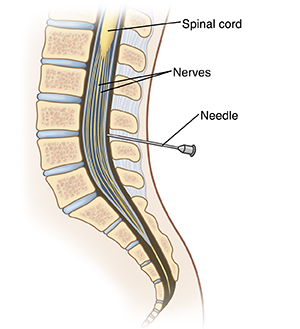Lumbar Puncture
A lumbar puncture is also called a spinal tap. A lumbar puncture may be used to collect cerebrospinal fluid (CSF) to diagnose possible diseases in your brain, spinal cord, and related structures. A lumbar puncture can also be used to inject a dye (contrast medium) or medicines around your spinal cord and brain.
What is a lumbar puncture?
A needle is used to remove and test CSF from the sac that contains your spinal cord and nerve roots. The spinal cord runs through most of your spine. It carries messages between your brain and the rest of your body. A lumbar puncture is usually done near the base of your spine, below where the spinal cord ends. Local anesthesia will be used. The needle enters the sac but does not touch the spinal cord. There is a risk of a headache or upset stomach after the procedure. This may occur because of a CSF leak under the skin. But this risk can be decreased with bed rest and drinking enough fluids during the first 24 hours after the test. Other risks include back ache, infection, bleeding, or other rare complications. Lumbar puncture is essential for diagnosing many nervous system conditions. It is advised when the benefits outweigh the risks. Sometimes this procedure is done with ultrasound or fluoroscopic guidance.
 |
| Spinal fluid is withdrawn from below the spinal cord. |
Before your lumbar puncture
Get ready for your lumbar puncture as instructed. After you check in, you will need to sign a consent form stating that the procedure has been explained to you. If you have questions, ask them before you sign the form. You may also be asked to put on a hospital gown. Your procedure will take 30 to 60 minutes. But allow extra time to check in.
What to tell your healthcare provider
For your safety and the success of your procedure, tell the healthcare provider or nurse if you:
-
Have any bleeding disorders
-
Take blood thinners or other medicines, including aspirin
-
Have any immune system problems
-
Have had any back surgery
-
Are allergic to medicines or iodine
Online Medical Reviewer:
Anne Fetterman RN BSN
Online Medical Reviewer:
Luc Jasmin MD
Online Medical Reviewer:
Raymond Kent Turley BSN MSN RN
Date Last Reviewed:
12/1/2022
© 2000-2024 The StayWell Company, LLC. All rights reserved. This information is not intended as a substitute for professional medical care. Always follow your healthcare professional's instructions.